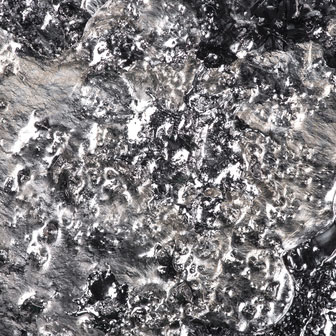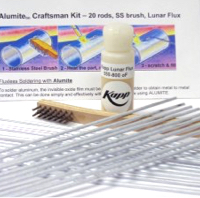There are many specific formulations for bearing Babbitt, each designed to meet the needs of specific bearings in use. However, Babbitt can be classified as either Tin-based or Lead-based according to the following table.
| Babbitt Classification | LIMITS | |||
| Surface Speeds (fpm) | LOAD (psi) | |||
| MIN. | MAX. | MIN. | MAX. | |
| 1,000 | 2,400 | 100 | 2,000 | |
| 100 | 1,000 | 100 | 500 | |
| fpm = feet per minute, psi = pounds per square inch | ||||
Generally speaking, Tin-based Babbitt is used in high-speed applications, whereas Lead-based Babbitt is used in low-speed applications.
Read more about the art and science of Babbitt Selection.
Babbitt Forms
By far the most popular Babbitt in bearing refurbishment today is DuraKapp™#2, available in 35 lb. ingots, 5 lb. notchbars, 1 lb. bars, 18” sticks and as continuous spray wire on 25 lb. spools, and in 250 lb. Payout Paks. Most other Babbitt formulas are available in ingot and bar forms only. They are too hard and/or too brittle to make in a wire form.
Kapp Alloy & Wire, Inc. is a world leader in high quality consistent Babbitt alloys. We combine high purity virgin raw materials and our proprietary Precision Microcasting™ process to create the world’s strongest, most consistent Babbitt. Like our world renowned DuraKapp™#2, all of our Babbitt alloys remain consistent from edge-to-edge and end-to-end through thousands of pounds of ingots and bars, and through thousands of miles of spray wire. Benefits to you include higher productivity, less rework, less cleanup, fewer defects and higher quality finished products.
All DuraKapp™ Babbitt formulations meet or exceed their engineering standards. Whether ASTM B23, SAE J460e, or QQ-T-390 specifications are employed, you can be confident in DuraKapp™ Babbitt. Individual batch analyses are available for every order from Kapp Alloy & Wire, Inc. As always, we stand behind our products with a 100% satisfaction guarantee or your money back.
Tin-Based Babbitt Specifications
The chart below lists several common Tin-Based Babbitt alloys and their specifications.
| INDUSTRY NAMES | ASTM B23 | QQ-T-390A | Tin (Sn) | Antimony (Sb) | Copper (Cu) | Lead (Pb) |
| Marine 11 D | - | - | 90.0 - 92.0 | 4.5 - 5.5 | 3.5 - 4.5 | 0.35 (Max) |
| No. 1, DuraKapp™ #1 | Grade 1 | No. 1 | 90.0 - 92.0 | 4.0 - 5.0 | 4.0 - 5.0 | 0.35 (Max) |
| NF A 56-101 (Code 101) | - | - | 89.0 - 91.0 | 5.75 – 7.25 | 2.75 – 4.25 | 0.35 (Max) |
| NF A 56-101 (Code 111) | - | - | 89.0 - 91.0 | 5.75 – 7.25 | 2.75 – 4.25 | 0.10 (Max) |
| Marine 11R | - | - | 89.0 - 89.5 | 7.5 - 8.5 | 2.5 - 3.0 | 0.35 (Max) |
| Nickel Genuine, DuraKapp™ #2 | Grade 2 | No. 2 | 88.0 - 90.0 | 7.0 - 8.0 | 3.0 - 4.0 | 0.35 (Max) |
| Marine 11 | - | - | 88.0 - 90.0 | 5.5 - 6.0 | 5.0 - 5.5 | 0.35 (Max) |
| 4X Royal Nickel Genuine | - | - | 87.5 - 89.5 | 7.25 - 7.75 | 3.25 - 3.75 | 0.35 (Max) |
| Diesel Special | - | - | 87.5 - 88.0 | 6.5 - 7.0 | 5.0 - 6.0 | 0.35 (Max) |
| NF A 56-101 (Code 102) | - | - | 87.0 - 89.0 | 6.75 – 8.25 | 2.75 – 4.25 | 0.35 (Max) |
| NF A 56-101 (Code 112) | - | - | 87.0 - 89.0 | 6.75 – 8.25 | 2.75 – 4.25 | 0.10 (Max) |
| Grade 11, DuraKapp™ #11 | Grade 11 | - | 86.0 - 89.0 | 6.0 - 7.5 | 5.0 - 6.5 | 0.35 (Max) |
| SAE 11 | - | - | 85.0 - 87.0 | 7.0 - 8.0 | 6.0 - 7.0 | 0.35 (Max) |
| Imperial Genuine | - | - | 85.0 - 87.0 | 6.5 - 7.5 | 6.5 - 7.5 | 0.35 (Max) |
| Turbine | - | - | 84.0 - 86.0 | 6.5 - 7.5 | 7.5 - 8.5 | 0.35 (Max) |
| Royal Armature | - | - | 83.5 - 84.0 | 8.0 - 8.5 | 7.5 - 8.5 | 0.35 (Max) |
| Super Tough, DuraKapp™ #3 | Grade 3 | No. 3 | 83.0 - 85.0 | 7.5 - 8.5 | 7.5 - 8.5 | 0.35 (Max) |
| NF A 56-101 (Code 103) | - | - | 82.0 - 84.0 | 10.25 – 11.75 | 5.25 – 6.75 | 0.35 (Max) |
| NF A 56-101 (Code 113) | - | - | 82.0 - 84.0 | 10.25 – 11.75 | 5.25 – 6.75 | 0.10 (Max) |
| No. 4 | - | No. 4 | 80.5 - 82.5 | 12.0 - 14.0 | 5.0 - 6.0 | 0.35 (Max) |
| NF A 56-101 (Code 104) | - | - | 79.0 - 81.0 | 9.25 – 10.75 | 9.25 – 10.75 | 0.35 (Max) |
| NF A 56-101 (Code 114) | - | - | 79.0 - 81.0 | 9.25 – 10.75 | 9.25 – 10.75 | 0.10 (Max) |
| NF A 56-101 (Code 106) | - | - | 79.0 - 81.0 | 11.25 – 12.75 | 5.00 – 7.00 | 1.5 – 2.5 |
| NF A 56-101 (Code 105) | - | - | 77.0 - 79.0 | 12.25 – 13.75 | 8.25 – 9.75 | 0.35 (Max) |
| NF A 56-101 (Code 115) | - | - | 77.0 - 79.0 | 12.25 – 13.75 | 8.25 – 9.75 | 0.10 (Max) |
| Grade 4, DuraKapp™ #4 | Grade 4 | - | 74.0 - 76.0 | 11.0 - 13.0 | 2.5 - 3.5 | 9.3 - 10.7 |
| NF A 56-101 (Code 107) | - | - | 73.0 - 75.0 | 6.00 – 8.00 | 3.00 – 5.00 | 3.00 – 5.00 |
| No. 5 | - | No. 5 | 61.0 - 63.0 | 9.5 - 10.5 | 2.5 - 3.5 | 24.0 - 26.0 |
| % Maximum Allowable Impurities: | Fe (Iron)=0.08, As (Arsenic)=0.10, Bi (Bismuth)=0.08, | |||||
Lead-Based Babbitt Specifications
The chart below list several common Lead-based Babbitt alloys and their specifications.
| INDUSTRY NAME | ASTM B23 | QQ-T-390A | Sn (Tin) | Sb (Antimony) | Pb (Lead) | As (Arsenic) |
| Choker | - | - | - | 6.5 - 7.5 | 92.0 - 94.0 | 0.20 |
| Durite, DuraKapp™ #15 | Grade 15 | No. 10 | 0.8 - 1.2 | 14.5 - 17.5 | Balance | 0.8 - 1.4 |
| Hardware No. 4 | - | - | 1.0 - 2.0 | 12.3 - 14.3 | 84.2 - 86.2 | 0.20 |
| Silverstone | - | - | 1.0 - 3.0 | 17.5 - 18.5 | Balance | 0.25 (Max) |
| No. 13 | - | No. 13 | 4.0 - 6.0 | 8.0 - 10.0 | 83.0 - 88.0 | 0.20 |
| Mill Anchor | - | - | 4.0 - 6.0 | 11.5 - 12.5 | Balance | 0.25 (Max) |
| Royal, DuraKapp™ #8 | Grade 8 | No. 6 | 4.5 - 5.5 | 14.0 - 16.0 | Balance | 0.30 - 0.60 |
| Star | - | - | 5.0 - 5.5 | 13.5 - 14.5 | Balance | 0.30 - 0.60 |
| NF A 56-101 (Code 201) | - | - | 5.0 - 7.0 | 14.0 – 16.0 | 77.0 – 79.0 | (0.5-1.0 Cu) |
| Grade 13, DuraKapp™ #13 | Grade 13 | - | 5.5 - 6.5 | 9.5 - 10.5 | Balance | 0.25 (Max) |
| NF A 56-101 (Code 202) | - | - | 9.0 - 11.0 | 14.0 – 16.0 | 74.0 – 76.0 | (0.5-1.0 Cu) |
| No. 11 | - | No. 11 | 9.0 - 11.0 | 11.5 - 13.5 | 74.0 - 79.0 | 0.20 |
| Sawguide | - | - | 9.0 - 11.0 | 18.5 - 19.5 | Balance | 0.25 (Max) |
| Heavy Pressure, DuraKapp™ #7 | Grade 7 | No. 7 | 9.3 - 10.7 | 14.0 - 16.0 | Balance | 0.30 - 0.60 |
| % Maximum Allowable Impurities: | Cu (Copper)=0.50, Fe (Iron)=0.10, Bi (Bismuth)=0.10, | |||||
Additional Babbitting Products
KappaTinning™ Compound is a dry mixture of pure powdered Tin and flux specifically designed for pre-tinning Cast Iron, Steel, Brass, Bronze, and Copper bearing shells. A one pound container of KappaTinning™ Compound contains about twice as much Tin and goes further than other tinning compounds currently on the market.
Kapp CopperBond™ Flux can be used with a Stainless Steel brush or Stainless Steel wool to draw out and remove the impurities from the bearing shell, before applying KappaTinning™ Compound to the surface. Particular attention should be given to Cast Iron bearings to remove silica surface skins, graphite, and other residues that may impair adhesion.



